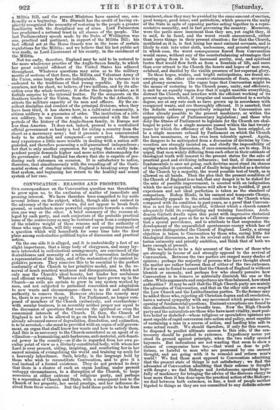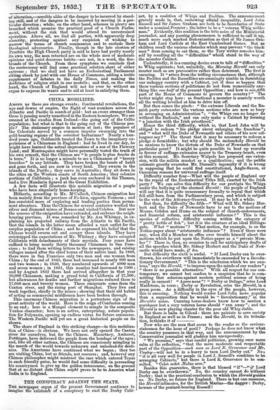CONVOCATION : REASONS AND PROSPECTS.
Ova correspondence on the Convocation question was threatening to grow upon us, to the exclusion of matter of immediate and pressing interest. We have therefore been compelled to lay aside several letters on the subject, which, though able and earnest in the advocacy of the writers' views, did not appear to break fresh ground, or contribute more powerful arguments towards a conclu- sion one way or the other. A brief summary of the reasons al- leged by each party, and such conjecture of the probable practical issue of the controversy as may be ventured upon from a comparison of the relative weight of these reasons and of the authority of those who urge them, will fitly round off our passing treatment of a question which will henceforth for some time take the first place among ecclesiastico-political topics of discussion and practical notion.
On the one side it is alleged, and it is undoubtedly a fact of no slight importance, that a large body of clergymen, and many lay- men interested in ecclesiastical arrangements, are convinced of the desirableness and necessity of a reform of Convocation including a representation of the laity, and of the restoration of its ancient le- gislative powers. They conceive this to be essential to the perfect conformity of the Church to her primitive model, and to the re- moval of much practical weakness and disorganization, which not only mar the Church's ideal beauty, but hinder her usefulness and efficient working. Whatever evils may have grown up in the Church—as evils are certain to grow in any system worked by men, and not subjected to periodical renovation and adaptation to new wants and circumstances—there is no fit and sufficient authority to remove them. However obvious the remedy may be, there is no power to apply it. For Parliament, no longer com- posed of members of the Church exclusively, and overburdene I with secular business, is an assembly neither proper nor equal to the discussion of questions that concern the spiritual or even the economical interests of the Church. If, then, the Church of England is not to be allowed to go on from bad to worse,—if her already advanced career of degradation, dissolution, and extinction, is to be arrested,—she must be provided with an organ of self-govern- ment, an organ that shall know her wants and how to satisfy them. And this is as necessary to the Church considered as an agent of ci- vilization—a humanizing, anti-barbarous, anti-material, anti-fanati- cal power in the country—as if she is regarded from her own pe- culiar point of view as a divinely-constituted body, with whom her Lord is ever present, aiding, inspiring, and comforting her in her sacred mission of evangelizing the world and training up souls for a. heavenly inheritance. Such, briefly, is the language held by those who wish to reconstitute Convocation, and to give it a real instead of a formal existence. They do not pretend to deny that there is a chance of such an organ leading, under present unhappy circumstances, to a disruption of the Church, to large secessions at either extreme of religious party, and perhaps to a separation of Church and State, with a consequent loss to the Church of her property, her social prestige, and her influence de- rived from these sources. But they hold these perils to be far from
imminent, since they may be avoided by the same amount of caution, good temper, good sense, and patriotism, which preserve the unity of the State in spite of opposing parties acting together in a repre- sentative assembly, and in fact governing the country. Moreover, were the perils more imminent than they are, yet ought they, it is said, to be faced, and the worst result encountered, rather than leave things in their present situation ; for that the Church, mutilated as it is, is fast losing her most eminent servants, and is likely to sink into utter sloth, uselessness, and general contempt; in which case, the worst consequences feared from Convocation would ensue, without any of the counterbalancing advantages that must spring from it in the increased purity, zeal, and spiritual lustre that would flow forth as from a fountain of life, and more than ever attract to the Church the hearts and hopes of men won, subdued, and dazzled by the visible presence of her supernal glory.
To these hopes, wishes, and bright anticipations, are found an- swering on the other side counter-statements of fears, aversions, and gloomy surmises. The vague hope that Convocation might be the means of restoring to the Church peace, unity, and efficiency, is met by an equally vague fear that it might unsettle everything, distract the Church, and interfere with the efficient working of its present agencies, which, if irregular and unauthorized to a certain degree, are at any rate such as have grown up in accordance with recognized wants, and are thoroughly efficient. It is asserted, that the definite reforms prospectively relegated to Convocation are either already possible to the present machinery, or within the appropriate sphere of Parliamentary legislation ; and those who deny the fitness of Parliament to legislate for the Church are chal- lenged to point to a single measure passed within the last twenty years by which the efficiency of the Church has been crippled, or to a single measure refused by Parliament on which the Church has been unanimous, or has even been tolerably agreed. Again, the dangers to be anticipated from a discussion of doctrine by Con- voeation are strongly insisted on, and chiefly the impossibility of saying where such discussions, if once commenced, are to stop. It is urged, that men widely differing from each other in their estimate of theological truth will consent to the present status for the sake of practical good and civilizing influences ; but that, if discussion of fundamentals is once set going, each doctrine must stand its chance of being called in question, and of finally being decided as a doctrine of the Church by a majority, the worst possible test of truth, as is allowed on all hands. Then the plea that the present condition of the Church of England is so bad, that any danger is to be risked for the sake of possible improvement, is scouted with an indignation which the most impartial witness will allow to be justified, if past experience and not ideal perfection is taken as the standard of comparison. Bishop Hinds, in his earnest and temperate Charge, emphatically appeals to the actual condition of the Church when compared with its condition in past years, as a proof that Convoca- tion is not the one thing needful, without which a church cannot adequately fulfil its evangelizing and training functions. Arch- deacon Garbett dwells upon this point with impressive rhetorical amplification, and goes so far as to call the suspension of Convoca- tion a special providence, and to attribute to that suspension the development of the unparalleled spontaneous energy which has of late years distinguished the Church of England. Lastly, a strong objection is taken to Convocation by those who, caring little for theological discussions, see in its revival only a fresh field for sec- tarian animosity and priestly ambition, and think that of both we have enough at present.
This we believe to be a fair account of the views of those who are strongly in favour of and strongly opposed to the revival of Convocation. Between the two parties are ranged many shades of opinion ; perhaps the majority of persons who have thought about the matter are rather between than of either of the two extremes. For few can be found to assert that the Church of England is without blemish or anomaly, and perhaps few who clearly perceive how Convocation is to remove or materially diminish the one or the other. While arguments and conjectures are thusbalanced, how stand authorities ? It may be said that the High Church party are mainly the advocates of Convocation, and that on the other side are ranged the Low Church and the Latitudinarian parties. To the former may be added those who, rejecting all Christian dogma and all revelation, have a natural sympathy with any movement which promises a re- opening of fundamental questions. Eminent exceptions are found to this classification, but it is broadly true. Now the High Church party and the naturalists are those who have most vitality, most posi- tive belief or disbelief—whose religious or speculative opinions are most capable of rapid conversion into action and policy, most capable of sustaining a man in a course of action, and landing him safe in some actual result. We should therefore, if only for this reason, be disposed to predict ultimate success io this side, if the con- troversy should be pushed to extremes. Expediency never yet stood its ground against principle, when the two really crossed bayonets. But indications are not wanting that seem to show a chance of compromise here too,—that word so dear to poli- ticians, so hateful to men who are possessed by one earnest thought, and are going with it to remodel and reform man's world ! We find those most opposed to Convocation admitting that the present state of things is not satisfactory ; we find the advocates of Convocation admitting that their scheme is fraught
with danger; find Bishops and Archdeacons speaking hope- fully of macinery for bringing the advice of the diocesan clergy to bear more than it has done upon the practical action of the Bishops ; we find between both extremes, in fine, a host of people neither bigoted to things as they are nor committed' to any definite scheme of alteration,—sensible alike of the danger to be incurred by stand- ing still, and of the dangers to be incurred by moving in a par- ticular direction ; while, on the other hand, schemes in plenty are broached which promise the practical good of a Church Parlia- ment, without the risk that would attend its unrestrained operation. Above all, we find all parties, with apparently deep sincerity, protesting against any suspicion of wishing to narrow the terms of church communion and to exclude their theological adversaries. Finally, though in the late election of Proctors the High Church party is said to have had pretty nearly its own way, the men returned are on the whole men of moderate opinions and quiet decorous habits—are not, in a word, the fire- brands of the Church. From these symptoms we conclude that the controversy will find some practical solution short of either extreme ; that we shall not have an Ecclesiastical Parliament sitting cheek by jowl with our House of Commons, adding a treble supplement of debates to the daily Times, and making the doctrines of religion stink in our nostrils ; and that, on the other hand, the Church of England will not for ever be without an organ to express its wants and to aid at least in satisfying them.



























 Previous page
Previous page